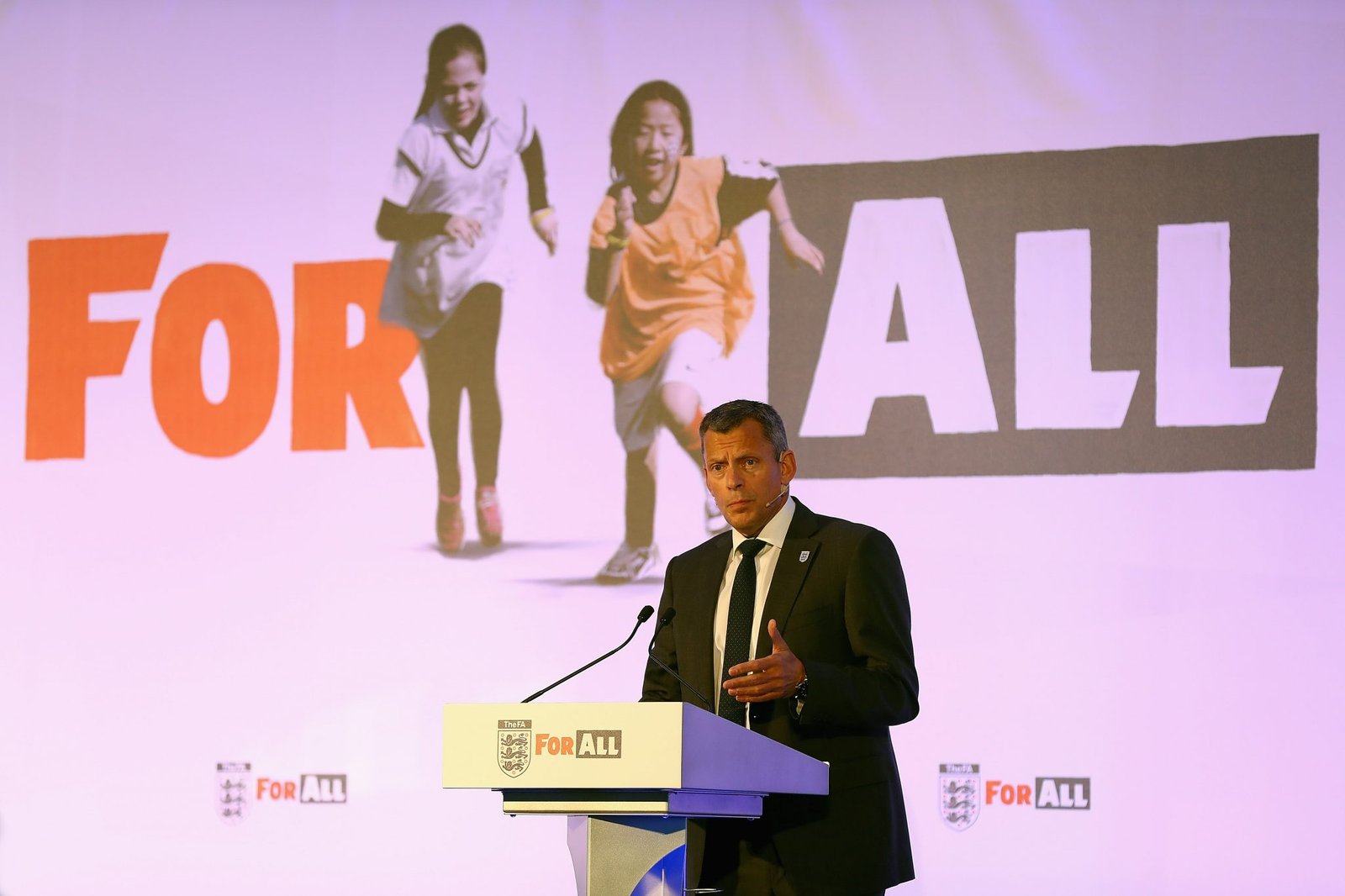Some basic reaction, info and links from yesterday’s announcements at a snazzy and well attended launch event at Wembley Stadium…
Monday (13th March) witnessed a pretty epic set of bold and specific statements of intent with regards to the women’s game from The FA and an honest acknowledgement of their failings, even if they did not go quite so far as admitting culpability. That these words came right from the top, from an organisation that has, in the past, struggled to move with the times and, and despite hard graft and great work from certain departments, failed to fully support all areas of the game, is a welcome and heartening sign.

The FA’s CEO Martin Glenn, speaking of The FA’s Women’s Football Strategy, at a suitably purposeful press launch at Wembley Stadium, admitted that The FA had ‘let down’ the women’s game. However, they now intend to ‘right those wrongs’. While international rivals like Germany have backed their women’s program more comprehensively over the past two to three decades, in England, The FA have been slower to do so. “We even banned it in its pomp,” added Glenn, “and we were slow to introduce it. We are addressing these failings.”
The FA regularly reviews its work and rejuvenates its aims and objectives every four to five years but yesterday’s announcement ramped things up a notch or five, and at the heart of the bold and encompassing new strategy is the drive and unifying force that is Baroness Sue Campbell.

A year on from joining The FA as Head of Women’s Football, her insight into what needed to be done to bring together the many strands of fine work being conducted by the band of passionate advocates she endearingly refers to as the ‘women’s pioneers of football’ and confidence that the right people given the right support can bring results, has surely formed the core of the strategy. (While her renowned ability for persuasive plain talking will surely have played a part in bagging some level of ‘buy in’ backing from the big guns like the Premier League too.)
Campbell lists amongst The FA’s goals the desire to change perceptions of the sport, to reduce social barriers to participation, for both the ‘serious and the casual participant’. If successful – and it will take enthusiastic involvement from schools and grassroots organisations on an unprecedented scale – then it could enable the game of football to transform the lives (and health and well-being) of countless women and girls. Alongside that zealous goal to get females active and engaged in football, is the competitive angle, the target of creating a winning England team that will ‘excel on the world stage’ and to be ‘the envy of the world’.
Kelly Smith MBE and Alex Scott joined the panel to talk about their experiences growing up playing the game, express their excitement at the plans and both also emphasised how important football in primary schools can be to young girls – they both missed out on the chance to play at school.
The message of the new women’s strategy fits perfectly into The FA’s vision that football is ‘For All’. It feels hugely encouraging to hear this acceptance that the organisation should be championing every aspect of the game, and for now at least, it smacks less of empty rhetoric and more of inspired determination. Of course, as with anything of this nature, the proof will be in the pudding but the desire at kick off at least, should be applauded.
But what are we all sort of waffling around?
If you haven’t got time to read the full thing, the new strategy and its main ‘Gameplan for Growth’ aims/priorities can be reduced in shorthand to encompass the following:
DOUBLE PARTICIPATION: To increase the no. of teams from 6,000 to 12,000, by 2020.
DOUBLE FANS: To increase average attendances at international matches from 11,000 to 22,000 and from 1,047 to 2,020 at WSL games, by 2020.
CONSISTENT SUCCESS ON WORLD STAGE: To be in the top three teams in the world, across all age groups and to have the potential to win the 2023 Women’s World Cup.
In FA Chairman Greg Clarke’s words, they wish to ‘transform an emerging sport’ and set a new benchmark. It’s great to see The FA realising the potential of women’s football in terms of strengthening the sport, rather than perceived as an annoyance or a drain on resources. This being, as he puts it in the strategy document: ‘the biggest single opportunity for us to grow our game.’
Other major discussion points arising yesterday were the intention to bid for a major international tournament in the near future, with the Euros in 2021 perhaps most likely (with France hosting the 2019 FIFA Women’s World Cup, it is unlikely that Europe will get the nod in 2023) and also that The FA will push for a Team GB side competing in women’s football at Tokyo 2020, though that matter is partially out of their hands (and subject to qualification in 2019).
“Clearly we can’t force that upon anybody – it has got to be done in a collaborative way,” says Sue Campbell of the Olympics decision. “We have already started those discussions with the home nations and by the end of next week we will have met Northern Ireland, Wales and Scotland.”
Plenty to talk about and all positive so far, with some decent coverage across the mainstream media and press (unless you read some of their comments sections – the trolls are hungry this week – for the usual spread of ill-informed or blatant prejudice). We will share some of the better links here, so have a read/catch up:
– http://www.bbc.co.uk/sport/football/39256164
– https://www.theguardian.com/football/2017/mar/13/baroness-sue-campbell-womens-football-fa-plan
– http://www.mirror.co.uk/sport/football/news/england-womens-team-showing-male-10021627
– http://www.dailymail.co.uk/sport/football/article-4308918/FA-reveal-plans-improve-women-s-game.html
And in case you have missed it, check out the video featuring Casey Stoney as part of The FA’s ‘For All’ brand campaign:

